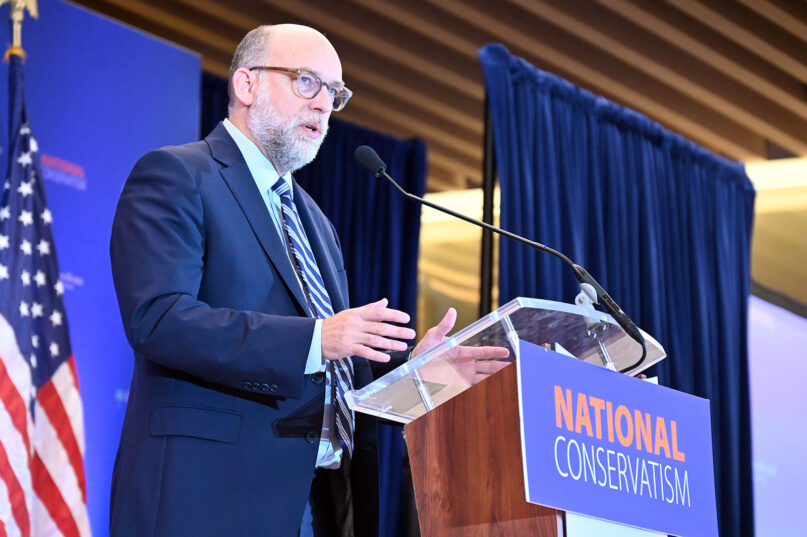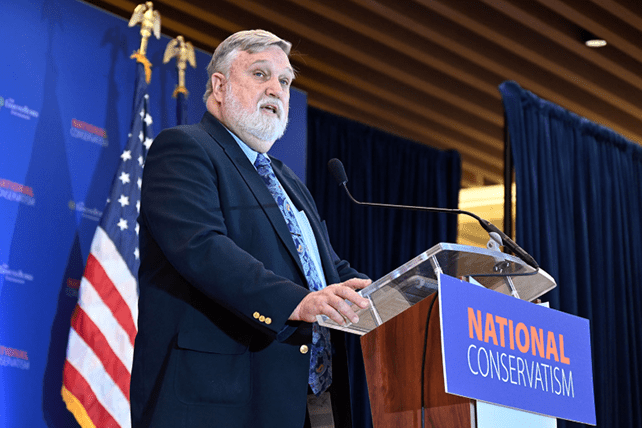WASHINGTON (RNS) — During the “Bible and American Renewal” breakout session at this week’s National Conservatism Conference, Josh Hammer stood out as the lone Jewish person on the panel of otherwise conservative Christian activists: a pastor, the editor of an online Christian magazine and a self-described Christian nationalist.
Yet, it was Hammer who told an audience member that “America was founded as a Christian country.”
“I’ll be the first to say that,” Hammer added. “There is very little doubt in my mind about that.”
The exchange was a window into a curious dynamic that permeated “NatCon,” as attendees call the conference, where speakers and organizers alike worked to craft a vision for a stridently conservative Christian America that somehow steers clear of anti-Catholicism and, especially, antisemitism.
A right-wing gathering that was once considered fringe, NatCon now boasts among its alumni Vice President JD Vance and this year featured a number of Trump appointees and allies, including Russell Vought, Office of Management and Budget director; Kelly Loeffler, director of the Small Business Administration; and Steve Bannon, a longtime podcast host and former chief strategist for President Donald Trump.

Office and Management and Budget Director Russell Vought speaks during the National Conservatism Conference, Sept. 3, 2025, in Washington. (RNS photo/Jack Jenkins)
Hammer was hardly alone in appealing to America’s Christian roots at the three-day conference, held in downtown Washington from Sept. 2-4. Idaho Pastor Doug Wilson, a self-described Christian nationalist, declared from the main stage, “We were in fact a Christian republic at the founding.” At a breakout session on “The Threat of Islamism in America,” one panelist declared “we are a Christian nation,” and another titled his talk, “Creating Islamic Communities in Christian America.”
But those declarations were made even as speakers openly voiced concern about the potential fracturing of NatCon’s fragile right-wing coalition. In an opening plenary session, Yoram Hazony, the Jewish chairman of the Edmund Burke Foundation, said early supporters of NatCon skewed heavily Catholic, so he brought in more Protestants — only for Catholics to fret that the movement had, in turn, become anti-Catholic. He has since wanted to bring in more Orthodox Jewish leaders, but is facing a problem: a rise in virulent antisemitism on the right, especially after the attack by Hamas militants on Oct. 7, 2023, in southern Israel.
“I didn’t think it would happen on the right, and I was mistaken,” Hazony said. He pleaded with the group to avoid antisemitism, noting that he is still willing to negotiate disagreement about Israel’s policies as well as have an “honorable conversation” about rethinking “the relationship between Jews and Christians in America.”
Hazony didn’t detail what that relationship looks like, exactly, but several conference speakers appeared to navigate the divide by referring to shared “Judeo-Christian” principles. Vought declared that the U.S. was founded on “Judeo-Christian worldviews.” Gene Hamilton, head of America First Legal, similarly described the U.S. as a “country based on Judeo-Christian values,” and Loeffler referred to “the moral foundations that built this country” — namely, “Judeo-Christian values.”
What’s more, Southern Baptist theologian Albert Mohler insisted that a conservatism that honors “prophets and apostles and patriarchs” can “unite Jewish conservatives and Christian conservatives, Catholic conservatives and Protestant conservatives, Eastern Orthodox conservatives, all in a shared conservatism of principle and conviction, mutual respect and mutual assistance, mutual commitment and commitment to shared conservative principles.”

